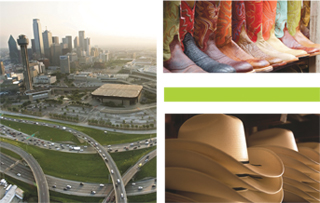Transportation opened the city up to immense growth. At the turn of the century, cotton was king, and Dallas was one of the biggest inland cotton markets in the world. By 1925, Texas was responsible for supplying more than one-third of the entire country’s cotton, 30 percent of which was produced within 100 miles of Dallas.
Since then, other industries have come to town, but according to the Texas Department of Agriculture, the state still ranks as the number-one producer of cotton in the United States.
It also remains a heavily agricultural state, accounting for about 6 percent of total U.S. agricultural income. In 2012, Texas ranked third nationally—to the tune of $6 billion—in agricultural exports. It also consistently makes the top ten list for some fresh fruit and vegetables including corn, sweet potatoes, watermelon, citrus, onions, and more.
Not surprisingly, given both its long growing season and proximity to Mexico, the state is a powerhouse of the produce industry. In 2012, it ranked 15th in the United States in terms of fresh vegetable exports, generating $38.9 million, up from $35.9 million in 2011. Among U.S. fruit exporting states, Texas was ranked 11th in 2012. Fruit exports outpaced vegetables, totaling $53.5 million versus $46.1 million the year before.
A Changing Produce Landscape
Dallas, while strategically important in terms of its location between the East and West Coasts, doesn’t actually have a terminal market.
According to Steve Ford, owner of produce broker Dallas Direct Distributing LLC, most Dallas produce businesses—from distributors and brokers to exporters, repackers, and receivers—are situated outside the city, where there is easy access to highways, abundant space, and affordable property. His own company is headquartered 25 miles southeast of downtown where warehouses are plentiful and can be customized with state-of-the-art cooling systems and loading docks.
Operating in downtown Dallas since 1941, the Dallas Farmer’s Market offers both wholesale and retail shoppers a range of local and regional produce, nursery items, prepared foods, and bulk items.
Formerly owned by the city, the market has been in sore need of renovation.
Yet according to Dallas-based marketing consultant Dedie Leahy, a group of local investors has purchased the market and plan to turn it into a destination for foodies and families.
The $64-million renovation is slated to wrap up this fall, and will feature a new infrastructure for the first shed with expanded space for farmers and vendors. The second building will house artisanal producers and the market’s food court.



